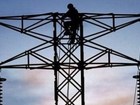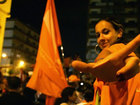The cabinet is scheduled to discuss the electricity crisis on Tuesday as ministers are expected to clash after growing discontent with severe rationing and accusations by Energy Minister Jebran Bassil and the Free Patriotic Movement that certain parties were putting sticks in the wheels of his electricity plan.
Snapping back at his critics that he is moody, Bassil told As Safir: “Moodiness is a trademark for others given that we are known for holding onto our stances and not changing them in accordance with the circumstances.”
 Full Story
Full Story
President Michel Suleiman and Premier Najib Miqati discussed the electricity crisis and the procrastination in the government’s appointment of civil servants to top posts, An Nahar daily reported Sunday.
Suleiman and Miqati held talks at Baabda palace on Saturday in an attempt to set the stage for a cabinet session that is scheduled to discuss the draft 2012 state budget and electricity.
 Full Story
Full Story
Free Patriotic Movement leader MP Michel Aoun’s “unprecedented” attack against the political class may be early signs of his preparations for the 2013 parliamentary elections battle, reported al-Liwaa newspaper on Saturday.
Informed political sources told the newspaper: “He is seeking to fortify his position in Lebanon seeing as he has started to detect that he has lost supporters in favor of his political adversaries.”
 Full Story
Full Story
Labor Minister Charbel Nahhas said on Friday that the wage hike decree issued as an annex in the official gazette is aimed at activating it before the end of this month.
“Accelerating the release of the decree was aimed at including the wage hike in January’s salaries,” Nahhas stressed to As Safir newspaper on Friday.
 Full Story
Full Story
Syrian authorities have said in their official report on the probe into the death of a 16-year-old Lebanese fisherman that his boat was in Syrian territorial waters when he was shot, informed sources told An Nahar daily published Friday.
The sources said that the head of the Higher Syrian-Lebanese Council, Nasri Khoury, handed over the report to President Michel Suleiman on Thursday.
 Full Story
Full Story
The deadlock on judicial appointments hasn’t been solved yet as President Michel Suleiman and Free Patriotic Movement leader Michel Aoun continue to hold onto their own candidates for the post of the head of the Higher Judicial Council.
An Nahar daily quoted Suleiman’s visitors as saying on Friday that the appointments should not be in a state of stalemate under any excuse. “Differences of opinion should not prevent the process of necessary appointments in the state.”
 Full Story
Full Story
President Michel Suleiman voiced on Thursday his optimism with Lebanon’s future, saying that the economy will improve when oil and gas excavation begins.
He said before his visitors: “The regional developments that have been taking place for about a year should motivate us to fortify Lebanon’s democratic system.”
 Full Story
Full Story
Lebanese Forces leader Samir Geagea hoped on Thursday that a statement issued by the Syrian National Council would put Lebanese-Syrian relations on the right path and called for U.N. Security Council action if Lebanon comes under attack by Syria.
The Council, which is Syria’s leading opposition movement, said Wednesday that it wants to start a new chapter in the complex and often-troubled relationship with Lebanon.
 Full Story
Full Story
The wage hike will be effective as of February after the official gazette, issued on Thursday, included the decree approved by the cabinet, which set the minimum wage at LL675,000.
The controversial wage increase was signed by President Michel Suleiman, Prime Minister Najib Miqati, and Labor Minister Charbel Nahhas after the cabinet adopted the deal between the Economic Committees and the General Labor Confederation, which was sponsored by Miqati in December at the Baabda Palace.
 Full Story
Full Story
President Michel Suleiman is exerting efforts to resume the national dialogue between Lebanese foes as he is seeking to convince the parliamentary majority and the opposition to meet, al-Joumhouria newspaper reported on Thursday.
Sources close to Suleiman told the daily that he is open to all suggestions and has expressed readiness to hold bilateral talks with various Lebanese leaders on the condition that they become the basis for holding the all-party talks.
 Full Story
Full Story



